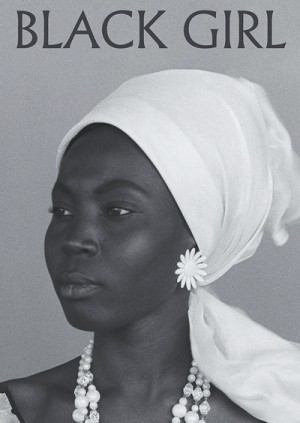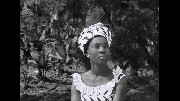La noire de… / Black Girl (1966), Sembene: The Making of African Cinema (1994), Borom sarret (1963) 2 x DVD9 and Blu-Ray Criterion Collection
on September 12th, 2018 at 17:39
Ousmane Sembene is considered by many to be the father of African cinema. A political activist, author, and filmmaker, the Senegalese Sembene made it his life’s mission to tell distinct African stories without white European influence (Senegal was once a French occupied territory). He made his feature debut in 1966 with the brilliant and stirring Black Girl. Featuring a moving central performance by M’Bissine Therese Diop, Black Girl is a harrowing human drama as well as a radical political statement — and one of the essential films of the 1960s.
Black Girl tells the story of a young Senegalese woman named Diouana (Mbissine Therese Diop) who travels to France to work as a servant to a white French couple (Robert Fontaine, Anne-Marie Jelinek). At first, Diouana takes her trip with optimism, thinking that her primary duties would be taking care of the couple’s children. That optimism quickly turns to despair as Diouana is immediately put to work, cooking and cleaning and doing everything the couple orders her to do. She’s treated more like a slave than a person, never allowed to travel around France and subjected to constant verbal abuse by Madame (Jelinek) while Monsieur (Fontaine) barely even notices her. She fantasizes about her home country before she left, even the possibility of a romance. But her desperation for money snaps her back to reality. Things start to fall apart when Diouana is the subject of racism by the couple’s dinner guests. As the tension mounts and Diouana’s insubordination escalates, the narrative takes a tragic and shocking turn that may be disturbing, but sadly isn’t surprising.

Director: Ousmane Sembene
Cast: Mbissine Therese Diop, Anne-Marie Jelinek, Robert Fontaine, Momar Nar Sene
Country: Senegal, France
Genre: Drama
BD50 + 2xDVD9 | 1080p AVC, NTSC | 00:59:40 | 45.3 Gb + 11.1 Gb + 3% rec
Language: Francais
Subtitles: English
Extras:
• On Ousmane Sembene (19:52) In this 2016 interview, Samba Gadjigo discusses Director Ousmane Sembene and his relationship with challenging the dominant conversation of the era through his films. It's an interesting look at the Director's work in context of the social political climate of Africa throughout Sembene's career.
• M'Bissine Therese Diop (12:32) In this 2016 interview, actress M'Bissine Therese Diop talks about how she came to the film simply trying to find work and wasn't particularly interested in acting and how the Director saw her casting photo. Diop was focusing on being a dressmaker at the time and designed her own wardrobe for the film.
• On Black Girl (21:37) Filmmaker and cultural theorist Manthia Diawara talks about the cultural significance of 'Black Girl' and 'Sembene's strong belief in equality between men and women as well as all the races of the world.
• Color Sequence (1:09) - The original version of Diouana's opening car ride from the airport through France. It was shot in color but was later changed to match the rest of the black-and-white film
• Prix Jean Vigo (2:02) This is an archival television interview with director Ousmane Sembene shortly after 'Black Girl' was released and awarded the Prix Jean Vigo.
• Borom Sarret (1963, 20:01) - Sembene's directorial debut is an eloquent look at the day in the life of a poor cart driver, who hopes to bring home money for his wife and new baby and ends up going flat broke. It's a quiet tragedy that plays out casually, driven by the cart driver's internal monologue as he toughs it out through a day at work.
• On Borom Sarret (12:36) Filmmaker and cultural theorist Manthia Diawara talks about the way Sembene managed to create a thorough cross-section of life in African cities with a seemingly simple short film.
• Sembene The Making of African Cinema (1:00:38) This film by Manthia Diawara is an impressive piece of work in the context that much of Africa's cinema came from French filmmakers living there and how Sembene was one of the first African filmmakers to emerge in that industry.
• Trailer
upstore
Black.Girl.1966.CC.BluRay.L.part01.rar
Black.Girl.1966.CC.BluRay.L.part02.rar
Black.Girl.1966.CC.BluRay.L.part03.rar
Black.Girl.1966.CC.BluRay.L.part04.rar
Black.Girl.1966.CC.BluRay.L.part05.rar
Black.Girl.1966.CC.BluRay.L.part06.rar
Black.Girl.1966.CC.BluRay.L.part07.rar
Black.Girl.1966.CC.BluRay.L.part08.rar
Black.Girl.1966.CC.BluRay.L.part09.rar
Black.Girl.1966.CC.BluRay.L.part10.rar
Black.Girl.1966.CC.BluRay.L.part11.rar
Black.Girl.1966.CC.DVD1.L.part1.rar
Black.Girl.1966.CC.DVD1.L.part2.rar
Black.Girl.1966.CC.DVD2.L.part1.rar
Black.Girl.1966.CC.DVD2.L.part2.rar








THANK YOU.